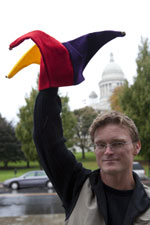This year’s Portsmouth Institute conference, next weekend, addresses “Catholicism and the American Experience,” a subject for which Rhode Island has provided fertile ground.
Reactions to school choice legislation in the General Assembly raise the question of whether "public education" really means the system by which the public educates itself.
Pending revisions to GDP appear to treat pension promises as risk-free assets, highlighting the difference between realities of accounting, politics, and resources.
Sam Howard misses the point of questions about who the RIGOP is and who is to blame for both its trouble's and the state's.
Legislation introduced in the RI House would offer a broad school choice opportunity for Rhode Island families and may indicate that the state's dire circumstances might finally be opening fissures for big ideas and bold policies.
Legislation submitted last week would allow people to gamble their assets (such as houses and investment accounts) at the new state-run casino.
The question of blame for Rhode Island's political culture requires an accurate view of how politics (and media) operates in the state. It's not sports or business competition; it's life.
The national scandals facing the Obama administration arguably point to the underlying causes of Rhode Island's economic troubles.
The most significant change on the employment-data front might be confidence in the numbers, not just in terms of their raw validity, but in terms of increasing understanding that a falling unemployment rate isn't necessarily a marker of economic health.
Rep. Larry Valencia's question on the relative morality of different taxes points to the question of how tax policy decisions should be made.
A "surveillance state" doesn't just snag those who are overtly criminal, and it can affect a society most profoundly by adding risk to creativity.
A proposed new quasi-public authority with powers of trespassing and eminent domain bring into question legislators' beliefs about rights, particularly in contrast with another bill to make it more difficult to restrain potentially dangerous patients and students.
Notes from testimony on tax-the-rich legislation raise interesting points about what happened with tax policy and the economy over the past five years and what would be likely to happen under other policies moving forward.
Some policy strategists on the right are looking to behavioral science for ways to use government to encourage preferred behavior, but conceding the appropriate role of government to manipulate has an intolerable cost.
Charting the fifty states' distance from their peak employment along with the party controlling the legislature shows some interesting results, not the least of which is the ability of other states to change their courses.
Taxpayers in the regional Chariho school district scored a substantial victory in getting the district to reduce its 2014 budget request to a zero percent increase, but in the long run, all such victories will be minor unless the victories start including elections for public office.
A professor of "religion in public life," by his flawed analysis of regional religious affiliation and same-sex marriage, nonetheless raises some interesting points.
A study finds that Medicaid doesn't measurably improve health outcomes by much, raising questions about why Rhode Island leaps into every government program that becomes available.
Rep. Larry Valencia wants to tax "the rich" at 10% in the name of equity and "shared sacrifice," but dynamic policy modeling suggests that the sacrifice will mainly be Rhode Island's.
A politically correct American Left encourages Americans to turn their eyes away from horrors that illustrate that which euphemisms cover, whether it's infanticide or global jihad.


| Sun | Mon | Tue | Wed | Thu | Fri | Sat |
|---|---|---|---|---|---|---|
| 1 | ||||||
| 2 | 3 | 4 | 5 | 6 | 7 | 8 |
| 9 | 10 | 11 | 12 | 13 | 14 | 15 |
| 16 | 17 | 18 | 19 | 20 | 21 | 22 |
| 23 | 24 | 25 | 26 | 27 | 28 | 29 |
| 30 |